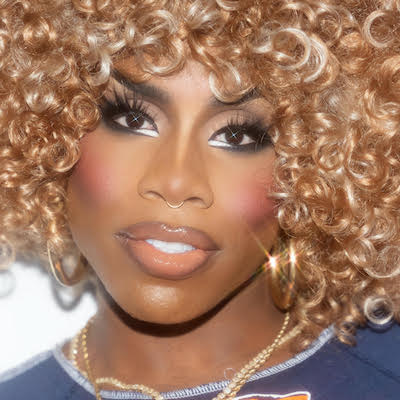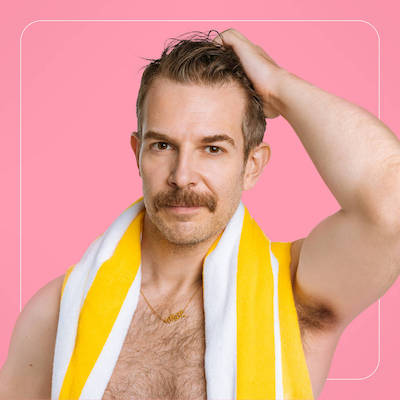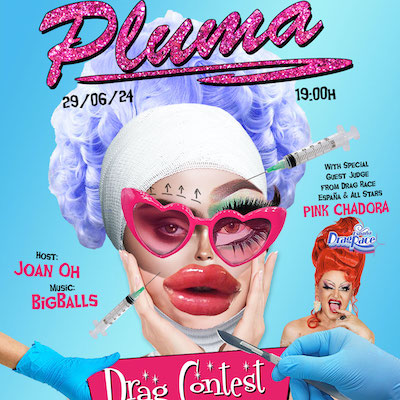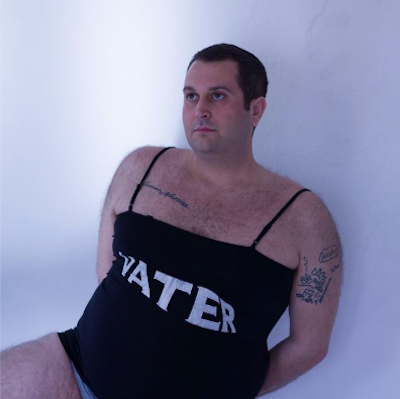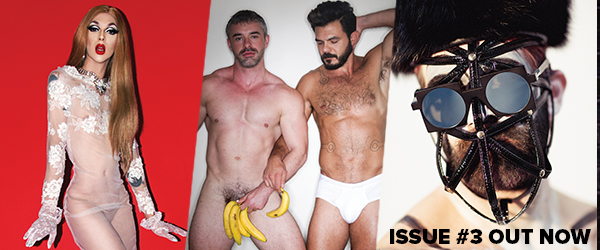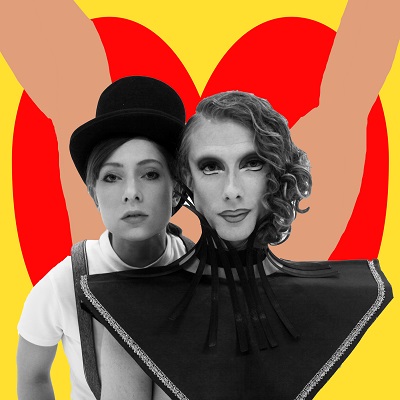
"We’ve gone for the funniest performers on the queer scene and the queerest performers on the comedy scene"
Celeste Dring is a comedian and Sue Gives A Fuk is a drag queen. Fed up of the very straight, very white, very male environment of the comedy circuit, Sue and Celeste have created Play Date, a queer comedy night at The Glory in London. Fallon Gold spoke to Sue about the night and why it is so vitally needed.
Tell us why you’ve created Play Date
I recently switched from performing on the cabaret scene to performing on the comedy scene, and I experienced a culture shock. Obviously I knew there would be straight white men in chinos. But I didn’t realize they’d ALL be straight white men in chinos.
And at many nights, audiences are literally encouraged to be hostile. I’ve performed at nights where the compere will say to an audience “who’s ready to destroy some dreams?” The result is that there’s no trust in the room, and in order to get the audience on side the performer has to do quite reassuring, comforting material before they’re able to try anything interesting. And even at nights with good comperes who don’t do that, comedy audiences tend to expect a performer to win them over before they’ll get on board.
Cabaret audiences, in my experience, are much more active participants. I guess part of it is that cabaret audiences tend to be participants in the local queer community that the performers are also part of, so there’s more of a bond. Whereas at mainstream comedy shows audience members are purely there as consumers. But I also think that comedy as a medium has a tendency to create bad vibes. You’re asking for one very specific thing from an audience: to laugh. And the audience is asking for one very simple thing from a performer: to make them laugh. This creates kind of a competitive environment where the audience has something to give and is reluctant to do so. That doesn’t exist so much in cabaret where the performer will be trying to curate a rich, varied experience and the audience knows that it will only get that by being open to it.
The reason I’d shifted towards the comedy scene was because I love comedy and I don’t think it has to be like this, so I didn’t want to give up. I wanted to try to create that participatory, exploratory atmosphere you get at a cabaret show, but at a comedy show.
What makes queer comedy queer comedy?
It’s an interesting question, because obviously alternative comedy exists and we’ve not chosen to go with that label.
Its not so much about either the content or the form of what’s going to be on stage. We’re not forcing all our performers to talk about gender or to dress in drag. Largely what we mean by queer comedy is just comedy done by and for people in the broad queer community. It’s a community that isn’t often catered to in the comedy scene and its my natural home, so these are the people I want to perform to and with. Our hope is that we can create discourse between that community and the comedy community.
Also, the thing about ‘alternative comedy’ is, it was invented in the 1980s to describe a particular thing that was happening outside of the mainstream then. That’s since become mainstream, yet the label has remained partially wedded to that movement. So while a lot of comedians performing what is described by that label are amazing, ‘queer’ fits better with who we and our audience are.
Where have you found the comedians who make up the Play Date bill?
50% from the comedy scene and 50% from the cabaret scene. Its amazing how few performers do both.
I’m co-running the night with Celeste Dring, who is one half of the very acclaimed double act Lazy Susan (ITV, BBC3, and Radio 4) and has worked quite extensively on TV and in Edinburgh. She’s infinitely more experienced than I am, but delightfully bought into the idea of the show. So she’s raided her contacts book for half the performers and I’ve provided the other half. We’ve gone for the funniest performers on the queer scene and the queerest performers on the comedy scene.
Your performers have worked with some big names. With Play Date, are you taking people who may usually be sidelined and putting them centre stage?
Two of our performers, Mae Martin and Lou Sanders, have performed stand up sets on Russell Howard’s Good News, which is very much the arbiter of mainstream comedy success in the UK. So I can’t pretend to be giving a platform to these performers, they’ve found a home in mainstream comedy, and we’re incredibly honoured to have them. What I would say is that you won’t often find more than the one token queer on any particular mainstream show, so hopefully if we bring all the token queers together we’ll be able to create a queer funny space for play that isn’t seen in the mainstream.
Then on top of that we’re combining such acts with established drag and cabaret performers. Again I can’t pretend that these acts are sidelined, because they’re very successful, but they’re not on 8 out of 10 cats, and it will be interesting to see how neatly they fit alongside stand up comedians.
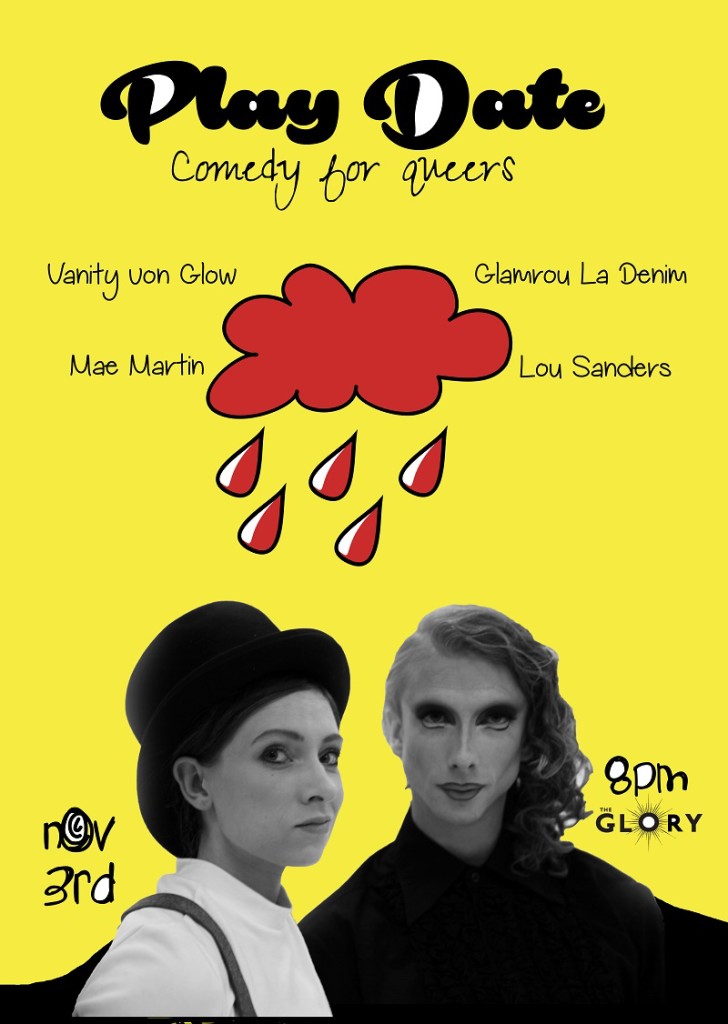
Comedy is notoriously dominated by straight white men and while there’s a lot of criticism about the underrepresentation of diversity on comedy bills and comedy shows, there’s still a great deal of tokenism that goes on – if they even bother with that. Do you see this changing any time soon?
Not very soon. As long as open mic nights are the way I described above, where the audience is baying for blood and the performer’s job is to make them feel comfortable, performers who are comfortingly normal will have an advantage. Even if more women, POC and queers are making it to the stage, they’re having to spend all of their sets reassuring the audience that yes, they are strange, and yes, they get that. So women come up and say “yeah, no you’re right, I’m ugly”. Queers come up and say “what gender am I? I don’t know. Weird right?” Asian performers come up and say “yeah I’m Muslim, I know, I’ve got a bomb in my bag, nah not really”. I’ve heard all of these sets regularly and its something straight white men aren’t nearly so hampered with. They’re able to launch into their material without having to spend so much time commenting on their appearance and legitimizing the audience’s reading of them. I really think that without concerted efforts to create more open, tolerant spaces at the ground level of the comedy scene, progress will be slow at best.
Why is it important that we create queer spaces for queer performers and audiences?
Because they’re all closing! And because if we don’t then we’ll have to go to straight places and we’ll be scattered and lose our community.
Is it worth trying to battle with the mainstream too – should we keep to our own or continue to fight to be represented on mixed bills?
I think we need to keep an eye on each. Queer people should have the opportunity to ‘make it big’ in comedy if that’s the route they want to go down. And while that is definitely possible now, its not as accessible as it should be. Getting mainstream audiences to relate to people who are not literally the same as them is a slow process. It’s about destigmatizing difference and softening moral imperatives to conform. Its happening, its just happening more slowly in comedy than elsewhere.
But we also need to make sure that we keep on fighting for our queer spaces too. Outside of comedy, in fashion, art and music, queers are on trend right now, and facsimiles of queer culture are popping up all over London and being marketed to straights. So rather than put in the hard work of building our own space its very easy for us to go to queer themed nights at XOYO or to watch Paris Is Burning at Secret Cinema.
But these things, like the whole trend for queerness, will be short-lived. And if queers invest in these nights at the expense of hard-earned queer spaces then our communities will be scattered as soon as the current trend wanes.
Will you tour Play Date outside of London?
I’d love to. And its important for queer things to exist in places that aren’t London. Let’s see how it goes down first though!
How do you see the future of Play Date and queer comedy?
Jonny Woo and John Sizzle at The Glory are up for Play Date becoming a regular, perhaps fortnightly thing in 2017. That would be amazing because it would become sort of like a new acts night, which is where the comedy scene is at its worst and most in need of a role model. So maybe we could be a regular dose of funny queer welcoming playfulness. I think that would be nice.
Catch the first Play Date at The Glory, London on 3rd November



